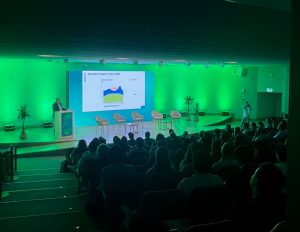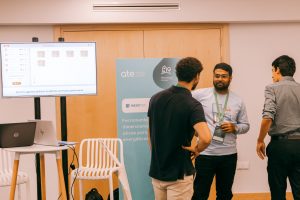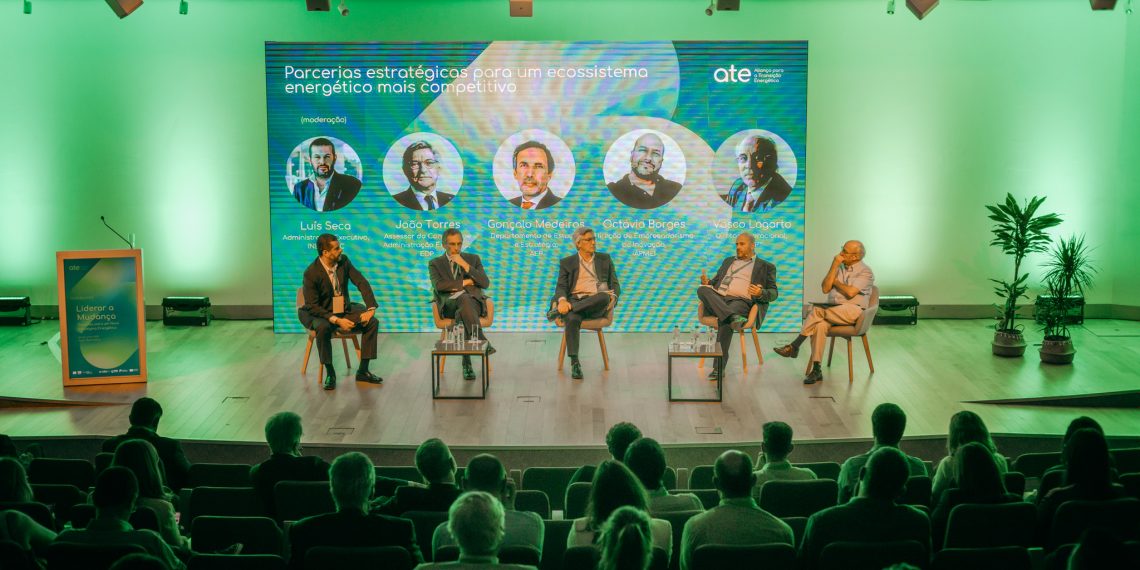The strategic partners of the Alliance for Energy Transition (ATE) – one of the largest Mobilising Agendas of the Recovery and Resilience Plan (PRR) – gathered on June 26 for a conference to discuss the challenges faced by the energy sector and present innovative and collaborative solutions that can further advance the project.
The event took place at the Super Bock Arena Congress Center in Porto, where experts in energy, technology, and sustainability presented the projects developed within the framework of the ATE Agenda. They assessed the activities and looked ahead to anticipate solutions capable of boosting the competitiveness of the energy ecosystem.
João Peças Lopes, director at INESC TEC, was the keynote speaker, presenting on “Energy Transition and Sovereignty: Innovation, Regulation, and Public Policies,” highlighting ways to strengthen countries’ energy autonomy and accelerate the transition to sustainable energy sources.

José Manuel Mendonça, director at INESC TEC and responsible for closing the event, stated that “what has been achieved” in terms of Mobilising Agendas was remarkable, noting that the ATE “continues to be a model Agenda.” He further mentioned that it “was defined ambitiously, involving the entire ecosystem, prioritising pragmatism and working hard to overcome obstacles, delivering the expected results.”
Other participants at the event included Luís Seca and Clara Gouveia, members of the INESC TEC Board of Directors, and Ricardo Bessa, a researcher at the Institute and coordinator of the Power & Energy Systems area.
The conference was organized by the Alliance for Energy Transition and welcomed close to 200 participants.
INESC TEC’s solutions
As part of the work promoted in domains like power & energy, IT, and entrepreneurship, INESC TEC also presented several solutions developed during the event.
In the energy sector, researchers presented the following solutions: HeatPowerOpt, FleetChargeXpert and Energy Hub (Filipe Joel Soares, António Manuel Coelho, Diogo Babo, and Nuno Fonseca), as well as an application developed in collaboration with GALP, presented by Alexandre Lucas.

HeatPowerOpt is a decision support tool for managing multi-energy industrial networks, based on a fully linearised mathematical model that enables predictive optimisation and economic evaluation of flexibility in spot markets and system services. FleetChargeXpert is a fleet management platform for electric vehicles, featuring intelligent charging planning and optimised management of the entire industrial infrastructure. Energy Hub for ports is an integrated decision support platform for port energy management, optimised to minimise energy costs and CO2 emissions. Finally, the tool developed with GALP allows for the sizing of assets for renewable energy communities, e.g., solar panels or batteries, based on the generation potential and historical consumption of the members, informing the managing entity of the optimal solution to minimise operational costs.
Regarding the IT sector, highlights included the Generic Forecaster, Voltus, and the CLOUDIA4.eu platform. Generic Forecaster is a forecasting service that simplifies and accelerates the construction of models tailored to various use cases in the energy sector. Voltus acts as a feature store, centralising variable engineering tasks and data processing, and providing tools to generate multivariate synthetic time series for model training. CLOUDIA4.eu is a digital platform for simplifying the use of AI agent process pipelines in the cloud. It includes forecasting services, synthetic data generation, and the Voltus feature store. These solutions were presented by INESC TEC researchers Fábio Coelho, Ricardo Andrade, Pedro Pereira, Adriano Maior, and Carlos Tarjano.

In the Business Acceleration domain, managed by INESC TEC, Alexandra Xavier, coordinator of the Innovation, Technology, and Entrepreneurship area at the Institute, and researchers Alípio Torre and Manuel Vítor Matos, presented (through a promotional video) the programme “Energy Transition – Energy Transformer.” This initiative is an intensive, hands-on capacity-building programme designed to accelerate the development and market entry of innovative solutions within the scope of energy transition. Developed in partnership with BETA-i, the endeavour offers collaborative, practical working sessions where participants receive specialised technical support, as well as methodologies and tools to help structure and validate their ideas. The first edition took place in 2025, with a second edition already planned for 2026.
The ATE Agenda
With a total investment of €274M by 2026, the ATE is carrying out various projects aimed at transforming and optimising the national energy system, involving the entire value chain of the energy sector. Led by EFACEC, it includes 80 partners, ranging from companies, research and development institutes, universities, laboratories, and public entities. The goal is to develop innovative products and solutions, inspired by the real economy, so that they can be explored in the market once the project is completed.
Some of the key areas include decarbonisation (e.g., in transportation and distribution infrastructures), digitalisation, and energy democratisation, designing energy-efficient products based on renewable sources that are accessible to residential users. Moreover, the development of skills – not only for companies and entities, but also for citizens and users – is another key concern of the ATE Agenda.
The researchers mentioned in this news piece are associated with INESC TEC and the Faculty of Engineering of the University of Porto (FEUP).
Photo credits – Alliance for Energy Transition (ATE)


 News, current topics, curiosities and so much more about INESC TEC and its community!
News, current topics, curiosities and so much more about INESC TEC and its community!